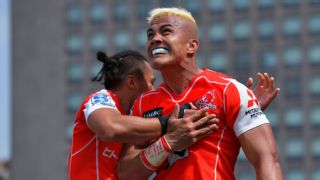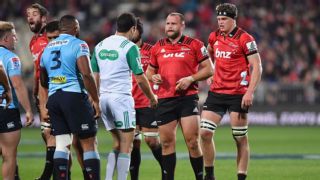|
Amidst the continual Waratahs bleat over 'we wuz robbed' refereeing decisions, an important Super Rugby moment has been overlooked -- a group of battlers have at last been rewarded for their initiative. Focusing on the Australian conference this season has often been excruciating viewing. So strange has it been that easily the most entertaining team in the conference is running a distant last - the Sunwolves. They are also the one taking the most risks. From the opening round where they confounded the Brumbies with several unexpected attacking manoeuvres, the Sunwolves have ignored convention. They have often played with a Barbarians-type feel, believing they can disrupt far stronger and experienced opponents by attacking from anywhere and from unorthodox angles. They are one of the few teams prepared to regularly attack from their own quarter. Quite often it hasn't worked, as their defensive and breakdown capabilities have fallen well short, as shown by them leaking an average of six tries per game, but when they have ball-in-hand, no-one, particularly themselves, are exactly certain what will eventuate. Watching the Sunwolves is, more often than not, an enjoyable experience. Seriously, try it, you will like it.  Easily last weekend's highlight was witnessing the most committed and emotional Super Rugby crowd of all at the Prince Chichibu Memorial Stadium in Tokyo revelling in the Sunwolves' first win over an Australian team when they humiliated the Queensland Reds 63-28. By full time, quite a few in the terraces were wiping away tears, after their team had provided them with endless moments of high-energy, big-hearted football, but most importantly their season's initial victory. There were moments of ingenuity, especially when a deft pass from lock Grant Hattingh put prop Craig Millar through, before he passed back to Hattingh for their first try. This was followed by an instinctive rubber-man-like around the opponent's body pass from centre Michael Little that placed pivot Hayden Parker in the clear to score. That try emanated from a Sunwolves scrum-win 60 metres out. Then the 'Tongan Godzilla' Hosea Saumaki, boasting a striking cropped blonde hairdo, took advantage of everything that came the winger's way, scoring three second half tries. Saumaki now boasts seven tries for the season- to be the competition's fourth equal highest tryscorer. The appointment of successful New Zealand coaches -- Jamie Joseph and Tony Brown -- has worked. They have been able to meld together an intriguing United Nations mix, which incorporates locals with New Zealanders, Australians, South Africans, Tongans, Fijians and even a Georgian or two. This will certainly not be their last win of 2018. And yes, the Sunwolves deserve to remain in the Super Rugby in whatever form the competition eventually ends up. Japan is a critical rugby area, and the game in South East Asia must be developed further. The Rugby World Cup in Japan next year is a crucial step in consolidating the game in this rich and untapped region. By appointing coaches like Joseph and Brown, it shows Japan is serious about becoming a viable international rugby nation, and that pair have already provided the Sunwolves with character and verve. At times during the season, Joseph and Brown have been sighted laughing in the coaches box at one of their players antics. The way the Sunwolves play is similar to the 'don't bother with the text book' approach taken by the Southern Kings in South Africa before they were dumped from the competition. We can only hope the Sunwolves remain imaginative, because Super Rugby definitely needs it. There is also a clear lesson for at one least one Australian province. In spite of limited success, Sunwolves home crowds have been substantial all season. Compare that to the Brumbies, and the rapidly vanishing numbers at GIO Stadium in Canberra. To only get 5,283 spectators to a Brumbies-Rebels home match last Saturday night is an embarrassment. Brumbies-types can complain all they like about how their stadium is inhospitable, and that there is a desperate need for a new venue in Canberra. That is true. A night at GIO Stadium is as appealing as a midnight skinny-dip in Lake Burley Griffin, and undoubtedly colder. But the over-riding factor why the Brumbies have lost their fan-base is that for some years now their playing style has been so unappealing. They are boring. There's little reward in toying with hypothermia when the Brumbies rarely produce anything memorable. Smarter to stay home. This year, their new coach Dan McKellar has dumb downed the team even further.  Long gone are the days of the magical Brumbies ensemble play where the likes of Stephen Larkham and Joe Roff would generate memorable stanzas of attack from every part on the field. Now it all revolves around a flawed territorial battle, with the midfielders lacking the skills to lift the tempo or surprise opponents. For several seasons, they relied heavily on the driving maul from the lineout, but that has also fallen away this year. The empty terraces in Canberra is further confirmation of Rugby Australia's stupidity to axe the Western Force. Merging the Rebels and Brumbies, where they shared their home games in Melbourne and Canberra, would have been a far smarter and less painful decision than getting rid of a thriving province in Perth. As those at Prince Chichibu and Western Force World Series Rugby matches will tell you -- provide an attractive product, they will come.
|
